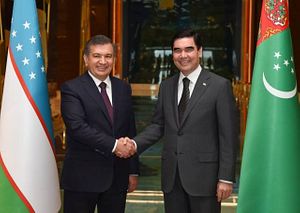Since his inauguration in December, Uzbek President Shavkat Mirziyoyev has been on something of a regional goodwill tour. While much of Tashkent’s regional policy has largely remained steady — Uzbekistan won’t be rejoining the Collective Security Treaty Organization (CSTO) any time soon, for instance — Mirziyoyev has opted for the kind of optics his predecessor, Islam Karimov, shunned over the past few years. From cozying up to Tajik President Emomali Rahmon to overseeing something of a thaw when it comes to resource policies, Mirziyoyev has tried to build relations with neighbors without the attendant acrimony Karimov brought to bear.
The latest bit of regional glad-handing came this week when Mirziyoyev visited his Turkmen counterpart along the Caspian coast. As Fergana News reported, Mirziyoyev held forth with Turkmen President Gurbanguly Berdymukhamedov, reinforcing one of the warmest relationships in Central Asia. (There’s a reason Mirziyoyev’s first international visit as president saw him travel to Ashgabat.)
But the visit wasn’t solely for the sake of enjoying the coastline. As the Turkmen government’s official site later related, Berdymukhamedov invited Uzbekistan to participate in Turkmenistan-Afghanistan-Pakistan-India (TAPI) pipeline — a proposal that Mirziyoyev apparently agreed to, at least in principle. As Fergana News noted, “Uzbekistan intends to participate in the construction of the TAPI gas pipeline,” adding that Mirziyoyev “said that he ‘voiced a proposal’ about the participation of the Uzbek side in the TAPI project.”
The details about any potential Uzbek involvement remain scant — would the new pipeline be known as TUAPI? UTAPI? — although it’s fair to assume that Uzbekistan would be acting as a hydrocarbon supplier, rather than recipient. The news may help assuage some of the recent fallout from the cancellation of Line D of the Central Asia-China pipeline, which had been planned as Turkmenistan’s most substantial pipeline running, partially via Uzbekistan, to China.
The move, as it is, comes amidst a flurry of developments surrounding TAPI, superficially injecting momentum into the stagnating construction plans. But much like the announcements surrounding TAPI-related surveys, Tashkent’s theoretical participation seems far more symbolic than substantive. That’s not to say that Uzbekistan’s participation, should it come to pass, wouldn’t be a boon to the project. Mirziyoyev’s new commitment is a step in a welcome direction for TAPI’s supporters. As Bruce Pannier told AKIpress in 2014, Uzbekistan’s participation “would show the project had more regional support. It would also give Turkmenistan a partner when negotiating with consumer countries.”
And that remains true. But a lack of regional support, as Pannier and other analysts have noted, isn’t the primary obstacle facing TAPI. Everything from Indian-Pakistani relations to security in Afghanistan continue to beleaguer TAPI’s prospects. And now, as The Diplomat’s Paolo Sorbello recently noted, Turkmenistan’s own gas industry is on its heels, tossing that many more questions at TAPI’s feasibility.
Mirziyoyev’s pronouncement shouldn’t be dismissed out of hand; if nothing else, there’s no harm in nodding toward improving regional relations. But Tashkent’s participation is not the silver bullet TAPI needs — even if it could bring a few more photo-ops along the way.

































